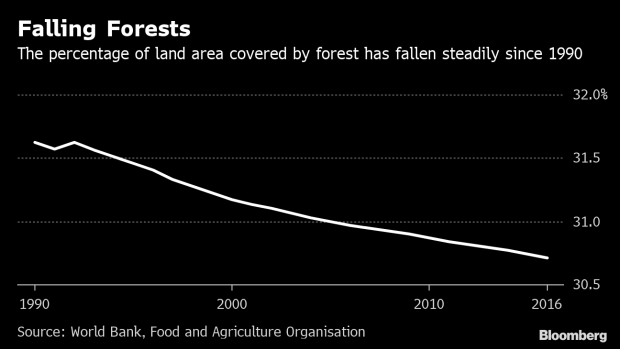Jun 10, 2019
Europe Criticized for Not Doing Enough to Slow Deforestation
, Bloomberg News

(Bloomberg) -- European companies aren’t doing enough to slow deforestation as they’re buying too much of commodities such as soybeans and palm oil from unsustainable sources, according to sustainable trade initiative IDH.
As forests shrink to produce timber and make space for crops like soy, cocoa and palm oil, that’s leaving fewer trees to absorb carbon dioxide and other greenhouse gases. While European business has made some progress in tackling deforestation, it’s behind on targets for purchasing sustainably grown commodities, Netherlands-based IDH said in a report.
Forest loss is continuing at an “alarming rate,” said Daan Wensing, a director at IDH. “Europe is dangerously behind when it comes to meeting its responsible sourcing and no-deforestation pledges.”
The European Union wants to lead the battle against global warming, and has pushed for restrictions on the use of palm oil on concerns its production caused deforestation and aggravated climate change. But producing nations say the claims are misleading and detrimental to countries that depend on the industry. For example, palm oil exports fetched Indonesia $17.8 billion last year and the industry contributes about 3.5% of its gross domestic product.
The share of the world’s land covered by forest has fallen steadily from 31.6% in 1990 to 30.7% in 2017, according to World Bank data. Deforestation also impacts biodiversity by destroying animals’ habitats.
Some countries are much better than others at buying sustainably produced commodities. The Netherlands sourced 83% of its soy in line with European feed manufacturers’ guidelines, while Italy, Portugal and Spain bought almost none. Nearly all of France’s palm oil purchases are certified sustainable, compared with less than half for Italy and Spain.
To contact the reporter on this story: Áine Quinn in London at aquinn38@bloomberg.net
To contact the editors responsible for this story: Lynn Thomasson at lthomasson@bloomberg.net, Nicholas Larkin, Dylan Griffiths
©2019 Bloomberg L.P.


